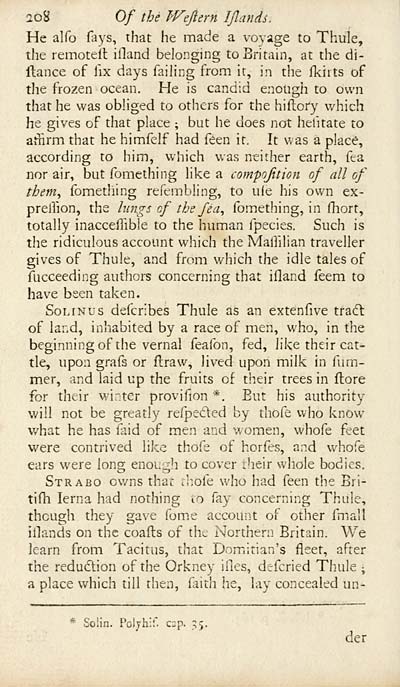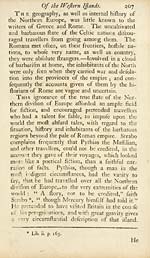Blair Collection > Critical dissertations on the origin, antiquities, language, government, manners, and religion, of the antient Caledonians, their posterity the Picts, and the British and Irish Scots
(246)
Download files
Complete book:
Individual page:
Thumbnail gallery: Grid view | List view

aoB Of the Weftern Ijlands.
He alfo fliys, that he made a voyage to Thule,
the remotelt illand belonging to Britain, at the di-
llance of lix days failing from ir, in the fkiits of
the frozen ocean. He is candid enough to own
that he was obliged to others for the hiftory which
he gives of that place ; but he does not helitate to
atiirm that he himfelf had feen it. It was a place,
according to him, which was neither earth, fea
nor air, but fomcthing like a compofuion of all of
them^ fomething refembling, to ule his own ex-
preflion, the hnigi of ths Jca^ fomething, in fhort,
totally inacceflible to the human fpecies. Such is
the ridiculous account which the Malfilian traveller
gives of Thule, and from which the idle tales of
fucceeding authors concerning that ifland feem to
have been taken.
SoLiNus defcribes Thule as an extenfive tradl
of land, inhabited by a race of men, who, in the
beginningof the vernal feafon, fed, like their cat-
tle, upon grafs or ftraw, lived upon milk in fum-
mer, and laid up the fruits of their trees in flore
for their M'i-ter provifion *, Eut his authority
v/ill not be greatly refpeded by thofe who know
v/hat he has faid of men and women, whofe feet
were contrived like thofe of horfes, and whofe
ears were long enoui^h to cover their whole bodies.
Strabo cv/ns that il^ofe who had feen the Bri-
tifh lerna had nothing to fay concerning Thule,
though they gave fom.e account of other fmall
illands on the coafls of thu Northern Britain. We
learn from Tacitus, that Domitian's fleet, after
the reducflion of the Orkney iiles, defcried Thule ;
a place which till then, faith he, lay concealed un^
Soiin. Polyhif. c-p. 35.
der
He alfo fliys, that he made a voyage to Thule,
the remotelt illand belonging to Britain, at the di-
llance of lix days failing from ir, in the fkiits of
the frozen ocean. He is candid enough to own
that he was obliged to others for the hiftory which
he gives of that place ; but he does not helitate to
atiirm that he himfelf had feen it. It was a place,
according to him, which was neither earth, fea
nor air, but fomcthing like a compofuion of all of
them^ fomething refembling, to ule his own ex-
preflion, the hnigi of ths Jca^ fomething, in fhort,
totally inacceflible to the human fpecies. Such is
the ridiculous account which the Malfilian traveller
gives of Thule, and from which the idle tales of
fucceeding authors concerning that ifland feem to
have been taken.
SoLiNus defcribes Thule as an extenfive tradl
of land, inhabited by a race of men, who, in the
beginningof the vernal feafon, fed, like their cat-
tle, upon grafs or ftraw, lived upon milk in fum-
mer, and laid up the fruits of their trees in flore
for their M'i-ter provifion *, Eut his authority
v/ill not be greatly refpeded by thofe who know
v/hat he has faid of men and women, whofe feet
were contrived like thofe of horfes, and whofe
ears were long enoui^h to cover their whole bodies.
Strabo cv/ns that il^ofe who had feen the Bri-
tifh lerna had nothing to fay concerning Thule,
though they gave fom.e account of other fmall
illands on the coafls of thu Northern Britain. We
learn from Tacitus, that Domitian's fleet, after
the reducflion of the Orkney iiles, defcried Thule ;
a place which till then, faith he, lay concealed un^
Soiin. Polyhif. c-p. 35.
der
Set display mode to: Large image | Transcription
Images and transcriptions on this page, including medium image downloads, may be used under the Creative Commons Attribution 4.0 International Licence unless otherwise stated. ![]()
| Permanent URL | https://digital.nls.uk/76289317 |
|---|
| Description | A selection of books from a collection of more than 500 titles, mostly on religious and literary topics. Also includes some material dealing with other Celtic languages and societies. Collection created towards the end of the 19th century by Lady Evelyn Stewart Murray. |
|---|
| Description | Selected items from five 'Special and Named Printed Collections'. Includes books in Gaelic and other Celtic languages, works about the Gaels, their languages, literature, culture and history. |
|---|

